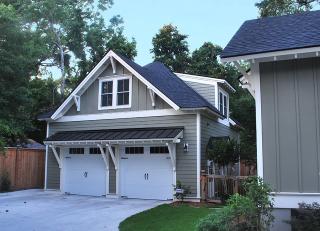Facts about Accessory Dwelling Units (ADUs)

The City of Salem allows Affordable Accessory Dwelling Units by right. The full text of the approved ordinance can be found in Section 3.2.8 of the Salem Zoning Ordinance, available here. Below is a response to frequently asked questions that pertain to the proposed affordable ADU ordinance. More information about ADUs is available at www.imaginesalem.org.
What is an accessory dwelling unit?
An accessory dwelling unit is an independent residential living area that is on the same property as a larger, primary dwelling. Accessory dwelling units go by many names, including but not limited to: “in-law suite” “second unit” “granny flat” “basement apartment” “garage apartment.” You can find out more about ADUs at this state website or this website from the AARP.
How is the accessory dwelling unit affordable?
The ordinance prohibits accessory dwelling units from being rented for more than 70 percent of the fair market rent limit for Salem, based on bedroom size, as determined by the United States Department of Housing and Urban Development (HUD).
The fiscal year 2023 fair market rent and the rent maximum is show in the table below.
| Studio | One bedroom | Two Bedroom |
Fiscal Year 2023 Fair Market Rent (FMR) Limit | $ 2,025.00 | $ 2,198.00 | $ 2,635.00 |
70% of the Fair Market Rent | $ 1,417.50 | $ 1,538.60 | $ 1,844.50 |
Where can I find what the fair market rent is for Salem? How often is the fair market rent adjusted?
HUD adjusts the fair market rent annually. The current fair market rents can be found here: https://www.huduser.gov/portal/datasets/fmr.html.
How can I apply for a property tax exemption for my ADU?
On September 23, 2022, Governor Charlie Baker signed into law a special state act granting homeowners in Salem the option of exempting the value of an accessory dwelling unit (ADU) on their property from their property taxes, so long as they are renting the ADU, including utilities, for a monthly amount affordable for those at or below 70% of the area median income. Currently, that means to qualify for the tax discount, the maximum rent and utilities for a studio ADU would be $1,417.50/month, for a one bedroom it would be $1,538.60, and for a two bedroom it would be $1,844.50. Salem homeowners who may be eligible for this property tax exemption should contact the Assessor’s Office at (978) 619-5608, or click here for more information. Applications for the exemption must be submitted annually.
What zones are ADUs allowed in?
ADUs are allowed in the RC, R1, R2, R3 and the NRCC zoning districts.
Does an ADU have size limitations?
Yes, the ADU cannot exceed 900 square feet or 50% of the size of your home, whichever is smaller and per health code requirements must be at minimum 350 square feet.
Is a parking space required for the ADU?
No.
Can the ADU be rented?
Yes. However, short term rentals are prohibited. Also, the owner must live on the property. The owner could live in the primary home and rent the ADU, or the owner could live in the ADU and rent the primary home.
Could the ADU be turned into a condominium and be sold separate from the primary home?
No. The ADU can never be sold separately from the primary home. Also, utilities for ADU and primary home are required to be on a single service (electric, gas, water and sewer).
How do I apply for an ADU?
Creation of an ADU will at minimum consist of a Building Permit from the Inspectional Services Department and a Certificate of Fitness (COF) from the Board of Health. ADUs may also consist of a Plumbing Permit, Electrical Permit and/or Gas Permit.
The City developed an interactive questionnaire, available here, to help guide you through the permit requirements. By answering the questions the system will inform the applicant of the permits required. All these permits are available here on the City's online permitting platform. The result of questionnaire is a "Project" that will group the required applications together for ease of tracking by the applicant.
Homeowners can hire their choice of architects or licensed contractors to design and build an ADU. This link is a good resource to find local builders.
| Attachment | Size |
|---|---|
| 1.77 MB |

